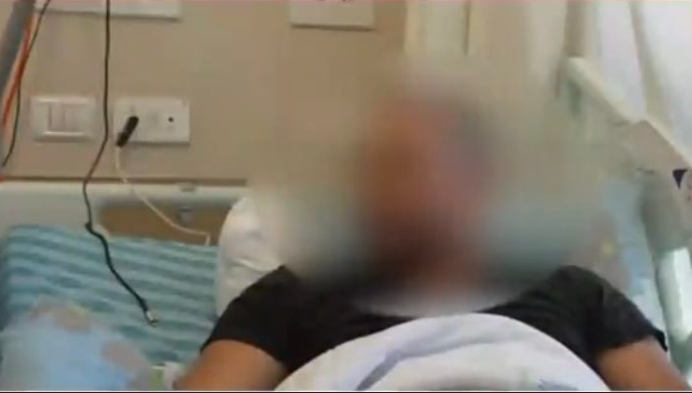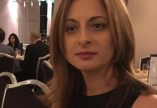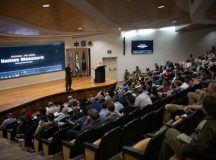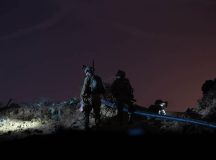Suzan Quitaz is a journalist at the Jerusalem Center for Public Affairs, having worked previously at the Qatari News Channel Alaraby TV, and on a number of documentaries for Al Jazeera International. She wrote in Fathom about the raw footage of the Hamas Pogrom shown to international journalists. Major ‘F’ is a Muslim Bedouin Arab officer in the IDF’s Desert Reconnaissance Battalion, a veteran of 20 years service, wounded in the Battle of Holit.
On the morning of 7 October 2023, when Hamas terrorists invaded Israeli communities alongside the border of Gaza, slaughtering at least 1,200 people and wounding more than 3,300 in a merciless assault, many soldiers rushed to help. Among the many stories of selfless bravery that accursed Saturday morning is that of a Muslim Bedouin Arab Israeli, Major ‘F’, an officer at the IDF’s Desert Reconnaissance Battalion, known as DRB.
On 25 October, at Sorka hospital in Beersheba, Israel, I meet with the seriously wounded ‘F’, who was injured in the first hours of 7 October in the battle of Holit, during which Hamas terrorists brutally killed at least 11 Israeli civilians, two foreign workers and took a number of Holit’s residents as hostages, including four Muslim Israeli Bedouins.
Brig. Gen. ‘F’ has been with the IDF over 20 years. He tells me he had never before encountered the kind of atrocities perpetrated by Hamas that day. ‘I saw many dead people. Kids, old people, men and women. The sight was very, very difficult. I saw dead soldiers whose hands and limbs were cut off and I saw people who had been burned alive’. ‘F’ continued, ‘I been with the IDF for over two decades and fought in previous wars, but the 7 October massacre was the most horrific barbarism I have ever witnessed’.
‘F’ says that when he and his IDF comrades went to Kerem Shalom, Sufa and Holit, they were expecting to fight terrorists but on arrival they were shocked to the core: ‘I tell you, the atrocities I saw with my own eyes, shows the terrorists had not a shred of humanity in them. They were heartless, they invaded homes, slaughtered and raped women including young girls. They even butchered toddlers’. He went on: ‘For me, it became very clear that they (the terrorists) wanted to kill us all. That they did not distinguish between children and adults, between women and men., between a Jew and an Arab. The terrorists want to kill every Israeli’.
‘F’, who is a Bedouin Muslim Arab-Israeli, tells me that Bedouin communities alongside the border with the Gaza Strip also paid a heavy price. Bedouin Muslims, including children and women, were also massacred on 7 October. Hamas rockets do not care if the missile hits a Bedouin village in Sderot or Tel Aviv. For Hamas, ‘we are all a target, solider or civilian’. With conviction, ‘F’ says ‘We are all Israelis and we all belong to the state of Israel. The Israeli flag is us all. We must stand shoulder to shoulder’.
On the morning of 7 October 7, ‘F’ received a call from his unit’s commander telling him there was an ongoing terrorist infiltration and that heavy clashes had taken place at the southern border, with many casualites. Shortly after 9am he arrived at Kerem Shalom crossing. He saw an IDF post had been hit but inside were dozen of captured terrorists. The commander of the IDF Nahal Reconnaissance unit had also been killed. He and his comrades engaged in an intense battle. ‘From morning to late evening, we fought the terrorists. Some of my comrades were hit. Later that day I was hit. Several bullets penetrated my legs. But praise God, by the end we managed to take control of the situation and get them out of Holit.’
While lying and waiting for comrades to come and rescue him, ‘F’ tells me that he was planning to take his own life, ‘I prefer death than be taken as a prisoner. So my country will not be forced to make deals or prisoners exchange, to save my life’.
‘F’ joined the IDF in his early 20s. During his service, he was never treated differently than his Jewish comrade-soldiers. ‘The IDF is my family in where everyone is treated equally and fairly. I am an Arab and Muslim and sincerely I have not felt a hint of racism or discrimination during my long service. In the IDF, regardless of whether you are Jewish or Muslim, we are all brothers,’ he says.
What was the reaction of his family and his community when he told them he was joining the IDF? ‘The truth is I did not seek permission from anyone. I went myself and signed up. Joining the IDF was a teenage dream of mine’. He continued: ‘Even if there were negative reactions to me joining the IDF, I wouldn’t have cared. I was guided by my own mind and heart. Today, 20 years on, I am very happy that I am part of the Israeli army’
The Changing IDF
‘F’ is among growing number of Arab Bedouin Israelis who are defying the tradition among many Arabs in Israel of opposition to Muslim Arab Israelis enlisting at the IDF. ‘F’, alongside many thousands of proud Bedouin IDF’s soldiers, points out that ‘when a rocket comes from Gaza or from Lebanon, it doesn’t distinguish between an Arab, a Jew or anyone’. This land, he adds, is my homeland too.
There is a misconception about the Israeli Army, not only in the Arab-Muslim world but also in the West. People believe it’s still predominately Jewish, whereas today it represents the whole state of Israel, Jews, Druze, Arab Muslims, Christians and Bedouins fighting alongside each other as brothers in arms.
A year ago, I had an in-depth conversation with a senior official from IDF Manpower Directorate, who is in charge of recruiting Arab Israelis, including Bedouins, into the IDF. (I am not authorized to reveal his name.) He explained that the IDF has seen a sharp rise in Arab Israelis volunteering to enlist in the IDF, on average between 650 to 800 annually. Israel’s Arab Christian society joins at a rate of roughly about 130 a year. However, he admits the appeal to join the IDF is much lower within Israel’s Arab Muslim society, here we are talking about 40 to 100 volunteers each year.
In 1956, the leaders of the Druze, an Arabic speaking community who practice an offshoot of Shia Islam, signed a ‘covenant of blood’ with the Israeli government, conscripting Druze males into the IDF. The Druze have a higher rate of enlistment than Israeli Jews, over 80 per cent of its men conscript in the IDF, with many serving in combat roles. For example, IDF’s Mishmar Ha-Gvul (Border police unit) is predominately run by Druze IDF soldiers. Today, many Druze have reached high ranking positions within the IDF. The current Commander-in-Chief of the famous Golani Brigade is Colonel. Ghassan Alian. Col. Alian has served in the IDF since 1990 and has dedicated his life to defending Israel. During Operation Protective Edge (2014), the Golani Brigade engaged in some of the heaviest fighting and he was seriously wounded. Another famous IDF infantry, the Givati Brigade, was commanded by another Druze Israeli, Col. Emad Fares.
While Jews and Druze are conscripted in the IDF, Israel’s Arab Muslims, Bedouins and Christians are exempted from compulsory military conscription. However, thousands have volunteered to serve in the IDF and over the years at least 130 have been killed defending Israel. Since the beginning of 2000, and especially in the past few years, the IDF has seen a steady increase of young men and women from these communities wanting to join the IDF. One of them, is Ella Waweya, an Arab Muslim Israeli women from Qalansawe. Ella joined the IDF in 2013. In September 2021 she was promoted to the rank of Major, making her the first Arab Muslim women to achieve this rank. IDF’s Unit 585 is manned by Jewish, Bedouin and Israeli Arab Christians and is led by Lt. Col. Nader Eyada, its first Bedouin squad commander.



































